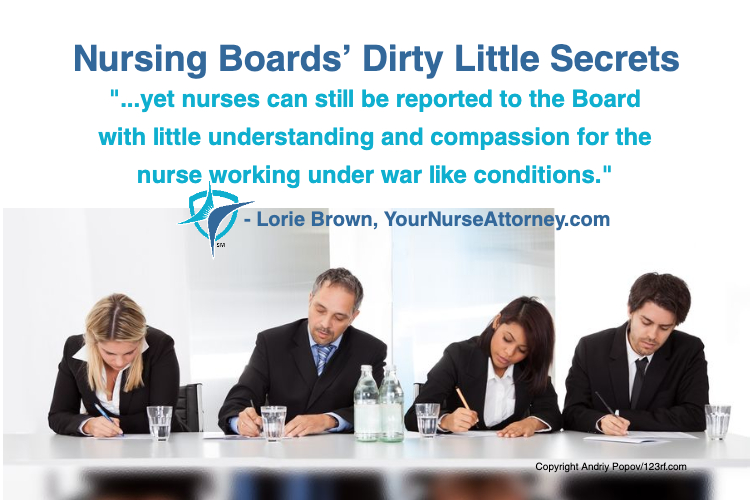I would think with the pandemic and with nurses being the number 1 most trusted profession (and in dire need) that nursing boards would have compassion toward nurses who are asked to work harder with more acute patients and with less staff.
These conditions make a recipe for a disciplinary matter before any board. Interestingly, patients’ right to sue for malpractice is curtailed during the pandemic because of the crisis and decreased staff yet nurses can still be reported to the Board with little understanding and compassion for the nurse working under war like conditions.
A board’s mission is to protect the public … not the nurse. If there are any concerns about public safety, specifically if working short-staffed, a board will take action. A recent article on MedPage Today discussed a national trend of boards being more aggressive with discipline and intimidating nurses. Maryann Alexander, Chief Officer of Nursing Regulations with the National Council of State Boards of Nursing states, “To my knowledge, they’re doing an excellent job. I know they are extraordinarily conscientious about their mission and their role.”
However, there are nurses (not attorneys) who consult with others facing board reviews who state otherwise. Among some of the states where these nurses have grievances are California, Arizona, and Missouri.
I caution that it is always best to hire a nurse attorney who is experienced in these matters rather than a nurse consultant who has only gone through such a matter.
A problem with many nursing boards is that they are mainly composed of educators or administrators rather than nurses who actively practice in the trenches like the people who they discipline. Even some consumer board member representatives were former health care executives.
In a malpractice case, one would have to have an expert working under same or similar circumstances to determine whether the nurse met the standard of care. The same should be true for nursing boards.
The National Practitioner Database (NPDB) reports from 2012 to 2016 actions against nurses have steadily increased but actions fell slightly from 2016 to 2019.
Also, actions against Advanced Practice Nurses increased 5-fold during the period of 2001 to 2014.
In my own personal experiences representing more than a thousand nurses, I do believe that the discipline is harsher today than when I first started as an attorney 30 years ago.
Also increasing over that same period are the number of complaints for investigation filed against nurses. An investigatory complaint means an inquiry of the nurse which may result in discipline.
Nurses also can be disciplined for personal issues as well such as neglected child support payments and a failure to pay state taxes.
Unfortunately, even if a nurse believes they have received an extraordinarily harsh decision, most nurses cannot afford to appeal it. The standard for review of an appeal by a court is that the decision must have been arbitrary and capricious. If there’s any basis to discipline a nurse, many courts will uphold the board’s decision because there is an explanation or justification for the board’s decision which can be reasoned from the body of evidence.
Therefore, the standards are vague. There are no bright lines in whether certain actions amount to a violation of the Nurse Practice Act and, if they do, what is the appropriate sanction.
It’s interesting that the same action in one state may get a result that would lead to a different result than in another state.
Unfortunately, it may get to the point where nurses may consider which State’s Nursing Boards are more lenient when they choose to practice in a particular state.
Please give your comments below as to whether you believe there should be discipline uniformity among the states and what can be done about the egregiousness of board actions.









Doris Carroll says
Thanks for this important information. You reminded me that organizations cannot be sued during Covid but certainly nurses can be disciplined. Thanks Lorie.
Theresa Ellingsen says
Any board action should include accommodation for the hospital to disclose the staffing situation of the day of the incident and the acuity of the day. The hospital should also be held accountable for the having a committee that has representation of staff nurses at the level the ANA recommends. That committee needs to disclose its activities that show that nurses’ concerns are being addressed. Every action against the nurse should be prorated relative to the staffing situation of the day of incident.
Laurie Romano says
I definitely feel there should be uniformity of discipline and punitive actions. At least with that there might be some standards that Boards of Nursing have to follow, instead of basically being given a free hand. There should also be a clear and attainable route for appeal, outside simply appealing a decision made by the Board, to the Board.
There are multiple layers of accountability that nurses must follow. Having a Board of Nursing that has no accountability and has the resources of the State on their side, with no nurses that actually get out and practice, seems to weigh the most against the practicing nurse.
Educators and non nurses do have useful contributions, but should not be the majority of a Board makeup. Professionals that would likely have a conflict of interest such as healthcare executives really don’t have a place on a Board of Nursing. Neither do others that either are not nurses, or have never practiced in a healthcare setting.
Having a Consumer Member, is questionable. No background in healthcare and no clue about what the reality of today’s practice arena or today’s nurse challenges.